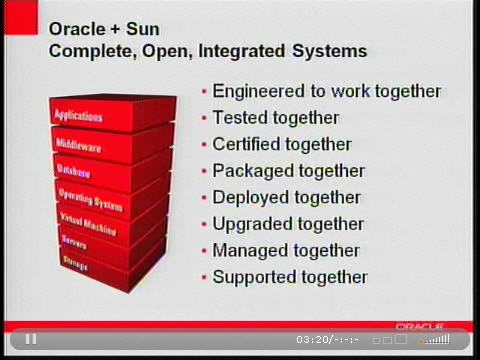Oracle-Sun: Strategy set; Will buyers go for the integrated stack?

Oracle on Tuesday began its mission to revitalize Sun Microsystems hours after it closed the acquisition of the hardware company. Using Oracle's acquisition of PeopleSoft---and the dozens of companies that followed---Charles Phillips, president of the company, said the company will invest in Sun, revitalize the brand and improve products and customer service.
The aim for Oracle: Take Sun, integrate hardware and software and recreate the gold standards of computing found in the 1960s. This vision gets at Oracle CEO Larry Ellison's T.J. Watson rant. Oracle wants to give you a complete environment that's very predictable.
Phillips also made another big point. Innovation going forward will focus on the interconnections between technologies not necessarily new developments. Phillips' pitch was targeted at investors, analysts and most importantly, Sun customers.
Also: Oracle's Sun strategy: What to expect · Oracle’s Sun acquisition gets approval from Europe; Strategy session set for Jan. 27 · Oracle lays out its vision for Sun: Will it work?
The message: Phillips said Oracle will invest in Sun and hire new engineers and sales support. As for R&D, Oracle will spend $4.3 billion in fiscal 2011. "We spend on the products. In lean years, this (R&D) is the one line that goes up," he said.
Phillips acknowledged worries that may be out there about the Sun purchase. "The only thing that matters is delivering on the product," he said. "We invest in the product, improve it and give people a better experience than they had before. We're going to do the same thing with Sun."
Operationally, here’s the game plan:
And Oracle plans to offer direct service for its largest customers by hiring 2,000 sales people. Phillips said he'll pay these experts more than their making and wants a bunch of all-stars---Derek Jeters of sales---as soon as he can hire them. Sun depended on third parties too much, said Phillips.
Oracle's powwow was scheduled to last five hours and cover hardware, software and strategies for integrated stacks of hardware and software. Oracle says that customers will benefit by making one call for help on a complete system stack. In the factories, Oracle plans to engineer automated support and fixes inside between Sun and Oracle products. "We're going to engineer in support ahead of time," said Phillips.
Phillips opened his chat with a funny quip about those billboards outing his affair with a writer-actress. "Hopefully you have had a smoother week than I've had," he said. With that topic---and the potential snickers that would go with it---off the table Phillips made the following points:
- Oracle's complete stack is an evolution of the industry and simple systems integration will be a big differentiator.
- Oracle will remain committed to open standards. "Where standards exist, we will use them up and down our product line," said Phillips. "We want to recreate that environment of the 1960s, but on open standards." Phillips added that it will continue to support MySQL and has an open source division.
- The secret sauce of Oracle-Sun will be the engineering between the software, disk and server subsystems.
- If successful, Oracle and Sun will lower the risk of IT change management.
Phillips brought on customers that talked how it's good to call one company for support. The argument is that IT buyers want one throat to choke. However, some buyers may chafe at the idea of the consolidation and being increasingly tethered to one supplier. Is the perk of calling one company for support outweigh the leverage you lose without vendor diversification?
Next step for Oracle: Phillips said the company will go on a 70-city road tour to outline the Sun plan. Sun's JavaOne show will be held in Brazil, Russia, India and China. In San Francisco, JavaOne will be co-located with Oracle OpenWorld.
